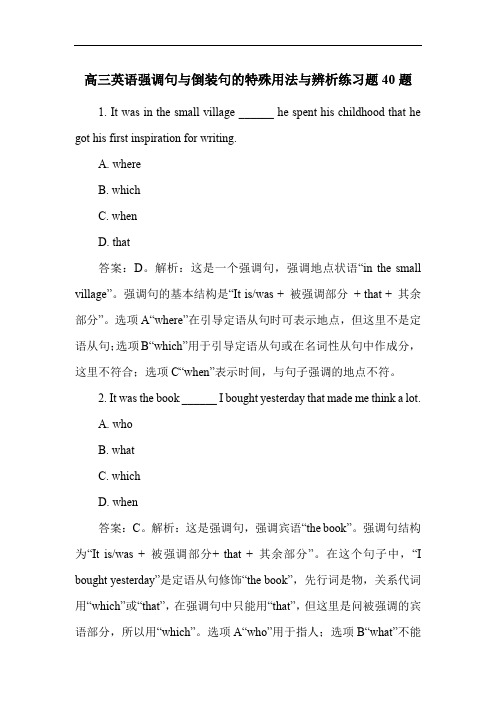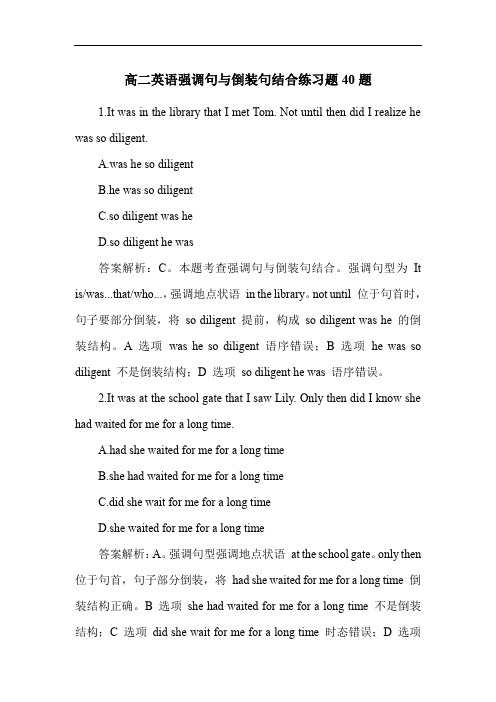强调句与倒装句
高考英语语法--强调句与倒装句式

高考专题:强调英语的强调主要有两种:一是强调非谓语(包括主语、宾语、状语等);二是强调谓语动词。
一、强调非谓语其基本句型是:“It + is/was + 被强调的成分+that/who + 其他成分”。
It 没有实意,只起语法作用,引导被强调的部分。
当被强调的是人时,可用who(m)/that, 其他情况用that。
It was I who/that met Jack yesterday. 是我昨天碰到了Jack.(强调主语)It was Jack that/who I met yesterday. 我昨天碰到的是Jack。
(强调宾语)It was yesterday that I met Jack. 是昨天我碰到了Jack.(强调时间状语)这几句话复原为非强调句就是:I met Jack yesterday.It is people, not things, that are decisive. 决定的因素是人,不是物。
(强调主语)It is because the book is very important for my present job that I bought it. 是因为这本书对我目前的工作很有用,我才买了它。
(强调原因状语)It was in the supermarket that I gave the book to him. 是在那家超市里我给了他那本书。
(强调地点状语)1.强调主语:It was John who broke the window. 是John打破了窗子。
原句:John broke the window.It is this overpass that will be pulled down. 将被拆掉的是这个天桥。
原句:This overpass will be pulled down.It is the people who/that are really powerful. 真正有力量的是人民。
专题11.必过语法---①强调句 ②倒装句 ③省略句 ④祈使句 ⑤感叹句 ⑥附加疑问句-2023年高

特殊句式1.特殊句式包括:①强调句①倒装句①省略句①祈使句①感叹句①附加疑问句2.高考考查热点:①强调句中的it和that①特殊句式中的there be①一些常用的固定表达结构高频考点突破考点1倒装句一、完全倒装完全倒装是指将句子中的谓语动词全部置于主语之前。
此结构通常只用于一般现在时或一般过去时。
二、部分倒装部分倒装是指将谓语的一部分,如助动词或情态动词,置于主语之前。
如果句中的谓语部分不含有助动词或情态动词时,则需添加助动词do, does或did,并将其置于主语之前。
将下列句子变为倒装句①She didn’t have supper until her mother returned.→Not until her mother returned .①I hardly think it possible to finish the job before dark.→Hardly .①He learned the sad news only after the war.→Only after the war .①He speaks English so clearly that he can always make himself understood.→So clearly .【答案】1.did she have supper2.do I think it possible to finish the job before dark3.did he learn the sad news4.does he speak English that he can always make himself understood考点2强调句强调句型的基本结构单句语法填空/补全句子①It was when I got back to my apartment I first came across my new neighbors.①It was only when the car pulled up in front of our house __we saw Lily in the passenger seat.① the noise of the street stopped.直到午夜,街上的嘈杂声才停止。
高三英语强调句与倒装句的特殊用法与辨析练习题40题

高三英语强调句与倒装句的特殊用法与辨析练习题40题1<背景文章>Emphatic sentences, also known as emphasis sentences, play an important role in English grammar. An emphatic sentence is a sentence structure that emphasizes a certain part of the sentence. The most common way to form an emphatic sentence is by using the structure "It is/was + emphasized part + that/who...". For example, "It is Tom who won the first prize." Here, the emphasis is on "Tom". Another example is "It was yesterday that I met him." In this sentence, the emphasis is on "yesterday".Emphatic sentences can be used to emphasize various elements in a sentence, such as subjects, objects, adverbials, etc. They help to make the meaning of the sentence more clear and vivid.Inverted sentences are also a special sentence structure. In some cases, in order to emphasize or for rhetorical purposes, the normal word order of a sentence is changed. For example, "Never have I seen such a beautiful scenery." Here, the negative adverb "never" is placed at the beginning of the sentence, causing inversion.Understanding and using emphatic sentences and inverted sentences correctly can greatly enhance the expressiveness and vividness of language.1. The structure of emphatic sentence is “It is/was + ___ + that/who...”.A. emphasized partB. unemphasized partC. any partD. random part答案:A。
高三英语强调句与倒装句的特殊用法与辨析练习题40题(带答案)

高三英语强调句与倒装句的特殊用法与辨析练习题40题(带答案)1. In the famous speech, "It was not the power of the individual but the strength of the community _____ made this change possible."A. whichB. thatC. whoD. what答案解析:B。
这是一个强调句,强调的是句子的主语“the strength of the community”。
强调句的结构是“It is/was + 被强调部分+ that/who + 其他部分”,当被强调部分是事物时,用that,这里被强调部分是“the strength of the community”,是事物,所以用that。
A选项which 不能用于强调句;C选项who用于强调人;D选项what不用于强调句结构。
2. "Only when we face our fears _____ we truly begin to live." Which of the following words can be filled in the blank?A. doB. didC. canD. will答案解析:A。
这是一个部分倒装句,“only + 状语从句”位于句首时,主句要用部分倒装。
根据句子的语境,这里描述的是一般情况,时态是一般现在时,所以要用助动词do来构成部分倒装。
B选项did 用于一般过去时;C选项can表示能力,不符合句子结构要求;D选项will用于一般将来时。
3. "Never before _____ such a beautiful sunset in this small town."A. have I seenB. I have seenC. had I seenD. I had seen答案解析:A。
高三英语强调句与倒装句的特殊用法与辨析练习题40题

高三英语强调句与倒装句的特殊用法与辨析练习题40题1. It was in the small village ______ he spent his childhood that he got his first inspiration for writing.A. whereB. whichC. whenD. that答案:D。
解析:这是一个强调句,强调地点状语“in the small village”。
强调句的基本结构是“It is/was + 被强调部分+ that + 其余部分”。
选项A“where”在引导定语从句时可表示地点,但这里不是定语从句;选项B“which”用于引导定语从句或在名词性从句中作成分,这里不符合;选项C“when”表示时间,与句子强调的地点不符。
2. It was the book ______ I bought yesterday that made me think a lot.A. whoB. whatC. whichD. when答案:C。
解析:这是强调句,强调宾语“the book”。
强调句结构为“It is/was + 被强调部分+ that + 其余部分”。
在这个句子中,“I bought yesterday”是定语从句修饰“the book”,先行词是物,关系代词用“which”或“that”,在强调句中只能用“that”,但这里是问被强调的宾语部分,所以用“which”。
选项A“who”用于指人;选项B“what”不能用于定语从句;选项D“when”表示时间。
3. It was Tom, not his classmates, ______ was praised by the teacher at the meeting.A. whoB. whichC. thatD. whom答案:A。
解析:这是强调句,强调主语“Tom”。
强调句结构是“It is/was + 被强调部分+ that/who( 当被强调部分是人的时候,可用who)+ 其余部分”。
高二英语强调句与倒装句结合练习题40题

高二英语强调句与倒装句结合练习题40题1.It was in the library that I met Tom. Not until then did I realize he was so diligent.A.was he so diligentB.he was so diligentC.so diligent was heD.so diligent he was答案解析:C。
本题考查强调句与倒装句结合。
强调句型为It is/was...that/who...,强调地点状语in the library。
not until 位于句首时,句子要部分倒装,将so diligent 提前,构成so diligent was he 的倒装结构。
A 选项was he so diligent 语序错误;B 选项he was so diligent 不是倒装结构;D 选项so diligent he was 语序错误。
2.It was at the school gate that I saw Lily. Only then did I know she had waited for me for a long time.A.had she waited for me for a long timeB.she had waited for me for a long timeC.did she wait for me for a long timeD.she waited for me for a long time答案解析:A。
强调句型强调地点状语at the school gate。
only then 位于句首,句子部分倒装,将had she waited for me for a long time 倒装结构正确。
B 选项she had waited for me for a long time 不是倒装结构;C 选项did she wait for me for a long time 时态错误;D 选项she waited for me for a long time 不是倒装结构且时态错误。
强调句和倒装句

2.6 so (much) …that 位于句首时要部分倒装, 如果谓语动词为be的一般现在时或过去时,则 如果谓语动词为be的一般现在时或过去时,则 为完全倒装形式。 So hardly _____ that people could hear it out in the street. A. did the students play the music B. the students playing the music C. the students played the music D. have the students played the music [答案] A 学生把音乐放得如此之大以至于在街上都 答案] 能听得见 。
1.4 强调状语 (1)强调时间状语 It was not until the accident happened _____ . A. when I realized my careless B. that I realized my careless C. as I realized my careless D. when my carelessness has been realized [答案] B 直到事故发生后我才意识到我的粗心大意 答案] It was in the year 1792 that the New York Stock Exchange was founded. 纽约证券交易所的成立是在1792年。 纽约证券交易所的成立是在1792年。
倒装句主要用于某些特定的句型和强调某个句中除 了谓语以外的成分。倒装句的语序有两种:全部 倒装和部分倒装。 2.1 当否定词或含有否定意义的词或短语放在句首 时,句子一般为部分倒装。这类词有:no, 时,句子一般为部分倒装。这类词有:no, never, seldom, neither, hardly, little, few, rarely, barely, scarcely, not, at no time, not only… but also, hardly (scarcely) … only… when, in no way, not until, under no circumstances, not a single word, no sooner… than等,如果谓语动词为be的一般现 sooner… than等,如果谓语动词为be的一般现 在时或一般过去时,则为完全倒装形式。
理解初高中英语中的倒装句与强调句结构

理解初高中英语中的倒装句与强调句结构英语语法中的倒装句和强调句结构是初高中学生学习英语时常常遇到的难点之一。
倒装句和强调句结构在句子中起到了突出和强调的作用,使句子更加生动有力。
本文将从倒装句和强调句结构的定义、用法以及注意事项等方面进行详细解析。
首先,我们来看看倒装句的定义和用法。
倒装句是指将谓语动词或助动词放在主语之前,改变了正常语序的句子结构。
倒装句的出现主要有三种情况:一是在以副词或介词短语开头的句子中,如“Never have I seen such a beautiful sunset.”(我从未见过如此美丽的日落);二是在以否定词开头的句子中,如“Not only did she win the competition, but she also broke the record.”(她不仅赢得了比赛,还打破了纪录);三是在以“so/such+形容词/副词”开头的句子中,如“So excited was he that he couldn't sleep.”(他如此激动以至于无法入睡)。
通过倒装句的运用,可以使句子更加突出和强调,增强语气。
接下来,我们来了解一下强调句结构的定义和用法。
强调句结构是通过使用“It is/was...that...”的形式来强调句子中的某个成分。
强调句结构的基本形式是“Itis/was+被强调的部分+that...”,其中,被强调的部分可以是主语、宾语、状语等。
例如,“It was Mary who won the first prize in the singing competition.”(是玛丽赢得了歌唱比赛的第一名)。
通过强调句结构的运用,可以使句子中的某个成分更加凸显,引起读者或听者的注意。
在运用倒装句和强调句结构时,需要注意以下几点。
首先,倒装句和强调句结构通常用于正式的场合或文学作品中,不适用于口语交流。
其次,倒装句和强调句结构的运用需要根据具体语境和句子的需要来决定,不能滥用。
- 1、下载文档前请自行甄别文档内容的完整性,平台不提供额外的编辑、内容补充、找答案等附加服务。
- 2、"仅部分预览"的文档,不可在线预览部分如存在完整性等问题,可反馈申请退款(可完整预览的文档不适用该条件!)。
- 3、如文档侵犯您的权益,请联系客服反馈,我们会尽快为您处理(人工客服工作时间:9:00-18:30)。
强调句与倒装句 一、强调句型 强调是为了用来加强句子的语气,突出说话的重点,区别不同的意思等。英语 书面中表示强调的手段主要有词汇、语法和修辞三种。含有这些强调手段的句 子统称为强调句。
1. 词汇手段 以下两类词汇可以帮助句子通过词汇手段实现强调H的。 (1) 通过 only, even,alone Just, ever;very,too, at all,on earch, in the world ,ratherz/entirely,completely, if ever ,if any •等单词或词组对其所修饰 的内容进行强调。 Do you know it at all ?你究竟知道不知道? Where on earth did you put the key ?你到底把钥匙放哪去了? He entirely forgot the matter!他把这件事完全给忘了。
(2) 通过强调词 however/whatever/whenever/wherever/whoever/whichever; no matter how/what/where/when/who/which 等实现强调 H 的。 However hard he tried ,he couldn't lift the box ・ 无论这么用力,他都无法举起这个箱子。 Whoever you are ,you should obey the rule •无论你是谁,都应遵守规则。 Take whichever of these paintings like best这些画中你最喜欢的无论拿哪一个都 行。
2. 语法手段 通过语法手段实现强调LI的的句型主要有以下儿种:
(1) It is /was+被强调部分+that/who从句 这是强调句型的常见结构。被强调的部分通常为主语、宾语、和状语。被强调 部分如果是人,其后的从句可以有Who引导也可以山that引导,如果被强调部 分是事物,其后的从句只能有that引导。翻译时被强调部分译成“是S “就是” 等。 It is Professor Li that /who sent me the letter . 给我寄信的是李教授。(主语) It was Anne who had a heart attack last night ・ 正是安妮昨晚犯了心脏病。(主语) It is this novel that they talked about last week ・ 他们上周讨论的就是这部小数。(宾语) It was doctor james that /whom we invited to give us alecture ・ 被邀请个给我们作报告的是詹姆士教授(状语) It is only when one is ill that one Knows the value of health. 人们只有生病了才知道健康的价值。(状语) It was at an evening party that I first saw her我是在一次晚会上首次看见她的。(状 语) (2) 主语+do/does/did+动词原形+其它部分
该句型主要用来强调谓语动词。如果句子没有助动词,在陈述句中的谓语动词 前+do表示强调,通常用一般现在时和一般过去时中,也可用于祈使句中。 These molecules are too small to be seen ,but they do exist. 这些分子小得儿乎看不见,但他们确实存在。 You are quite wrong -she does like you .你大错特错了 ----- 她的确喜欢你。 In the past, some people did think that the earth was square . 从前,有些人的确认为地球是方的。 Do send them these electronic elements today.务必今天把这些电子器件送给他 们。
(3) What引导的名词从句+is/was+其它成分 这一句型主要用来强调主语或宾语。 What impressed me most was her image.给我印象最深刻的是她的印象。 What I like is his writing style .我喜欢的是他的写作风格。 What matters is health but not wealth,真正重要的是健康而不是财富。
(4) the+比较级。。。the+比较级。。。(参见第二章第二节形容词和副词的比较等级的 用
法)
3. 修饰手段 通过修饰手段实现强调目的的主要有以下儿种情况: (1) 重复:通过关键词的重复或同义词以及相似表达法的使用。
Keener and keener the competition becomes 竞争变的越来越激烈。 I'll never ,never forget what he had done to us ! 他对我们所做的一切我永远、永远也不会忘记。 (2) 通过特殊疑问句、附加疑问句、反问句等疑问句形式表示强调。
What is it that you want to say ?你究竟想说什么? What the hell do you mean ? 你究竟是什么意思? Let's go to the concert, shall we ?我们去听音乐吧,好吗? “ He has resigned." " Has he ? “ "他辞职了。""是吗" (3) 倒装。通过倒装实现强调也是一种重要手段。这一点详见下面倒装句部分的讲 解
二•倒装句型 英语中的自然语序通常是“主语在前,谓语在后”。如果谓语动词的一部分或全部 放在主语的前面,这样的语序成为倒装语序。 The boy rushed out.(自然语序) Out nished the boy (倒装语丿了;)男孩冲了出来。 倒装语序乂分为完全倒装和部分倒装两种。 Now comes your turn・(完全倒装)现在轮到你了。 Only in this way can we lose weight.(部分倒装)我们只有通过这种方式才能减肥。 按U的来分类,倒装句型可分为两类:因语法结构引起的倒装句和因强调引起的倒 装句。 1•语法倒装句型 (1) 疑问倒装 Can you operate the new machine ?你能操作这台机器吗? In what way are they different ?它们在哪些方面不同? (2) There be句型的倒装 There are many forms of energy •能量有多种形式。 There stands a stone bridge across the river.河上有座石桥。 (三)表示祝愿的倒装 May you succeed !祝你成功! Long live the greet unity of all nationalities country !全国各族人民大团结万! (4) 以here ,there ?now,then,thus等副词为旬首的句子倒装。谓语动词通常是be动 词,come,go,exist,fol low 等不及物动词。 Here is the book you want •你要的书在这。 There goes the bell •铃响 了。 Now is the hour ,when they say goodbye •他们告别的时候到了。 Then follows the fashion show •然后是时装表演。 (5) 表示否定或基本否定的词与词组放在句首的句子的倒装。
这些词与词组主要有: n ever, seldom^carcel^hardly^rarely, little,not, no where,o n no way(绝彳、) hardly...when.・・(一。。就),no sonner...than.・・(一□ o 就),in no case(绝不) on no account(绝不),at no time (从不),under (in)no circumstances(绝不) not only...but also…(不但。。而且。。。)
Never has any country made so much progress in such a short time ・ 从来没有一个国家在这么短的时间内取得过这样大的进步。 Rarely did Tom leave his lab those days.那儿天汤姆很少离开他的实验室。 Nowhere was the lost car to be found .丢失的车哪里都找不到。 No sooner had they got to the plant than they started to work ・ 他们一到工厂就开始工作了。 (6) ”onl尸状语“放在句首的句子倒装
Only by working hard can one succeed.只有努力才能成功 Only once have I seen him 我只见过他一次。 (7) 反复倒装
如果前面分句中所述情况也适合后面的分句,后面的的分句常以SO (肯定句), nor,neither或no more (否定句)开头引导倒装句。 They can leave now, so can we・他们现在可以离开,我们也可以。 Our society has changed and so have the people in it。 社会变了,社会的人也变了。 He didn't see the film last night, neither did she 他昨晚没有看电影,她也没看 (8) 虚拟条件句中的倒装
虚拟语气中条件从句省去if时,were,had,或should须放在主语前 Were it not for your help , I wouldn^t hav己 got what I have today 要是没有你的帮助,我就不会有今天。 Had I left a little earlier J would have caught thr train 要是早点动身就能赶上火车。 Should he act like that again , he would be punished ・
